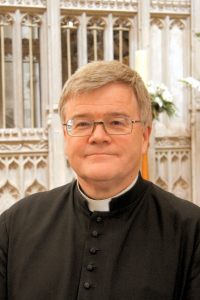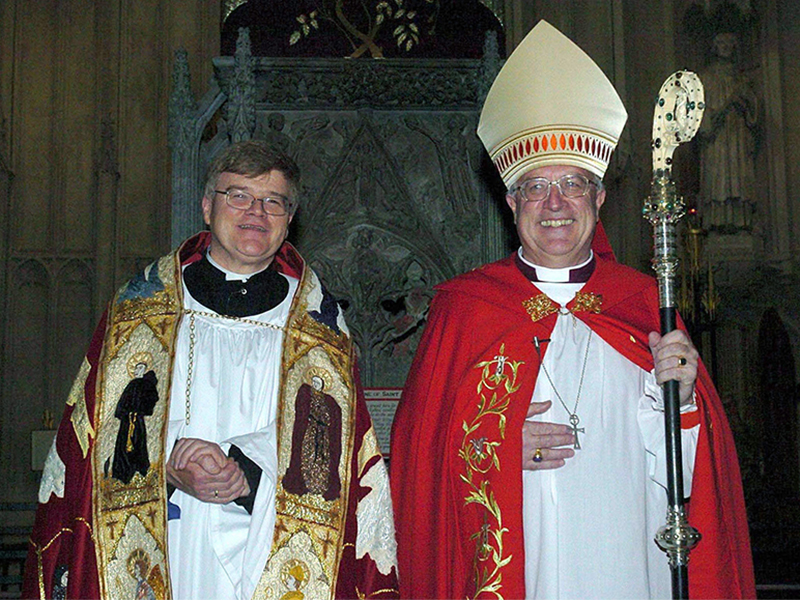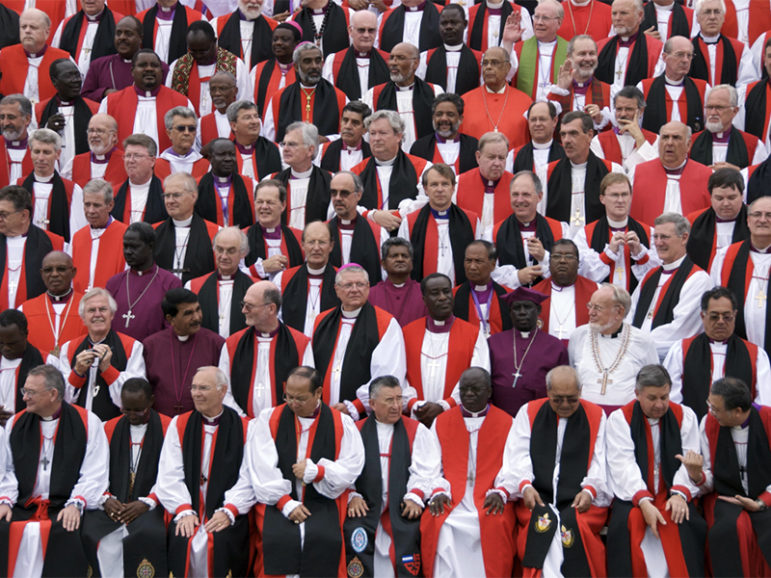LONDON (RNS) A Christian leader, according to the New Testament Book of Titus, must be God’s steward. He must be “blameless — not overbearing, not quick-tempered, not given to drunkenness, not violent, not pursuing dishonest gain. Rather, he must be hospitable, one who loves what is good.”
For the past 14 years, when the Church of England and the Church in Wales have been looking to fill the post of bishop, one candidate has come up time and time again who people think fits this bill: Jeffrey John. Yet, over and over again, he has been rebuffed.
It happened first in 2003 when John was chosen to be bishop of Reading, only for the appointment to be revoked. It has happened twice this year, in Sodor and Man, a Church of England diocese, and in Llandaff, in Wales.
[ad number=“1”]
This month it emerged that John has been rejected as a candidate for bishop a remarkable seven times. For the man himself, it is a personal blow. But John’s rejection is about more than one man. It is about the worldwide Anglican Communion and the lingering division in its ranks over homosexuality.
The communion itself has become increasingly confused about homosexuality during the 21st century, and the possibility is growing that it may split, as liberal voices in the West call for the recognition of gay relationships and the installation of gay clergy, while hard-line evangelicals, also in the West, join forces with loud voices in Africa to denounce toleration of homosexuality and refuse to countenance any lessening of church teaching.

The Very Rev. Jeffrey John, the dean of St. Albans Cathedral in Britain. Photo courtesy of St. Albans Cathedral
John, a 64-year-old theologian and dean of St. Albans Cathedral, has made no secret of his own homosexuality, and is in a civil partnership with another priest, a relationship he says is celibate. He has also made clear his support for same-sex marriage.
That has made John the subject of hard-liners’ ire. Supporters say his honesty about his homosexuality and his views about same-sex marriage have cost him the bishop’s seat, while some other bishops are known to be “quietly gay.”
John, who declined to be interviewed, is viewed by many as a “poster boy” for homosexuality in the church.
“He hasn’t wanted to be, but that is how things have developed,” said one person who knows him well. “If the hard-liners get to hear any whisper of Jeffrey being an episcopal candidate, they shout loudly and they lobby to stop it. And people cave in.”
The greatest debacle over John’s candidacy came in 2003 when he was recommended for the post of suffragan bishop of Reading and was initially backed for the role by the then-archbishop of Canterbury, Rowan Williams.
[ad number=“2”]
After a concerted campaign by evangelicals, revelations in the press about his views of gay relationships, and a letter to The Times from nine bishops opposed to him because of his stance on homosexuality, Williams summoned John to a meeting and said he was no longer prepared to support his consecration.
Several hours later, Williams issued a statement saying that John was withdrawing from his appointment.
“There is an obvious problem in the consecration of a bishop whose ministry will not be readily received by a significant proportion of Christians in England and elsewhere,” read a statement from Williams following the incident.
It went on to point out that homosexuals are full and welcome members of the church and are loved by God. But as Williams’ biographer Rupert Shortt put it: “A good man was being sacrificed on the altar of church unity — the cause that a church leader is especially likely to rate over all others.”

The Very Rev. Jeffrey John, left, an openly gay priest, stands with Bishop Christopher Herbert after his installation as dean of St. Albans Cathedral in Britain on July 2, 2004. Photo courtesy of Reuters/Mike Stephens/Pool
As a Welshman, John was a strong candidate for the dioceses of St. Asaph and Bangor in 2008. His candidacy was considered for the Church of England’s bishoprics of Southwark in 2010, Exeter in 2013, St. Edmundsbury and Ipswich in 2014 and most recently, Sodor and Man earlier this year. The Church in Wales also turned him down for the Diocese of Llandaff.
Under the Church of England system, the Crown Nominations Commission selects bishops.
While the commission engages in open discussion and some open votes, there are also secret ballots to choose which two candidates are then put forward for the prime minister to choose and the queen — the supreme governor of the Church of England — to endorse.
According to Simon Sarmiento, a close friend of John’s who runs the influential Thinking Anglicans website: “There is this huge fear that if he is made a bishop, provinces abroad will quit the Anglican Communion. Nor is all the opposition abroad. There are evangelicals in Britain opposed to him as well who, while not numerous, are noisy.”
Williams’ successor, Justin Welby, has spent considerable time since his appointment in 2013 traveling the globe, trying to keep the communion together.
[ad number=“3”]
Meanwhile, in England, the gay issue remains divisive. During February’s General Synod, homosexuality was once more on the agenda when a bishops’ report, backed by Welby and the Archbishop of York John Sentamu, suggested there should be no blessing of gay partnerships or gay marriages. The rest of the bishops backed it unanimously.
That leaves gay marriage in limbo, unlikely to be considered again until the 2020 Lambeth Conference of the Anglican Communion.
It leaves John dean at St. Albans, a cathedral with a fine liturgical tradition and a considerable amount of theology offered through courses and lectures. It plays a strong role in the life of the surrounding community.
One former staff member at the cathedral said: “Jeffrey is a warm, very caring man and a superb preacher. He has that rare gift of being intellectual but without losing the common touch.”
“People there love him and they share the sense of injustice that he has not been made a bishop,” the staffer said.
And for John, he is left still with a sense of what might have been.
“He has a very strong sense that he has been called to be a bishop,” said his friend Sarmiento. What he wants is that injustice to be acknowledged by his being made a bishop.”
Meanwhile Welby and Sentamu have commissioned a theological review of the work of the Crown Nominations Commission, the body that appoints bishops. A statement from the commission stated, “it is very conscious of its responsibility to ensure that the full richness and diversity of Church voices are represented.”
But it is that very diversity — a Church of England and an Anglican Communion that includes both gay clergy like John and hard-line evangelicals — that caused the crisis in the first place.
(Catherine Pepinster is a correspondent based in London)





